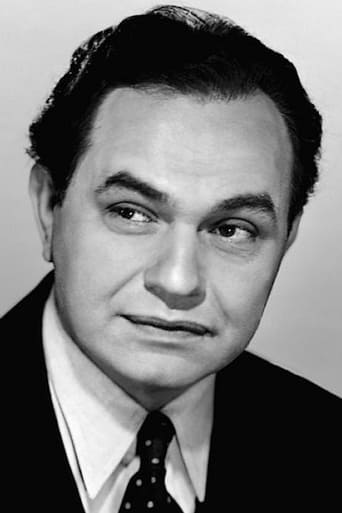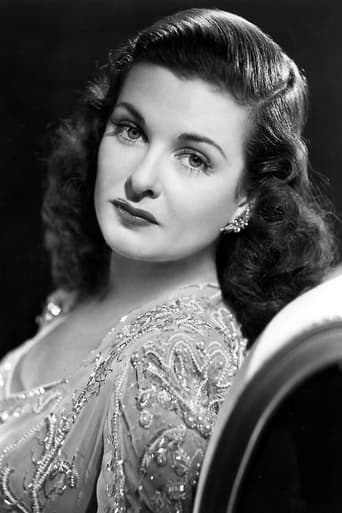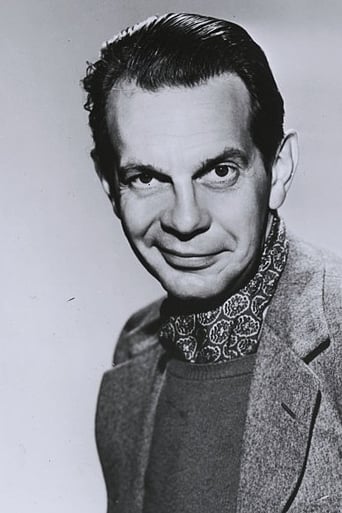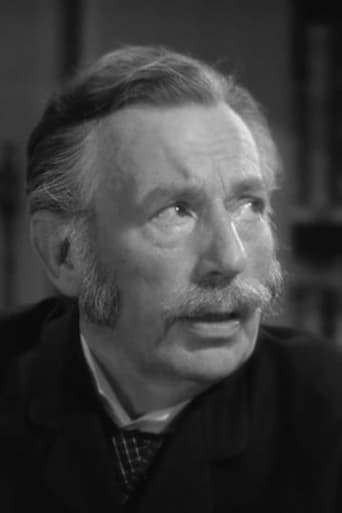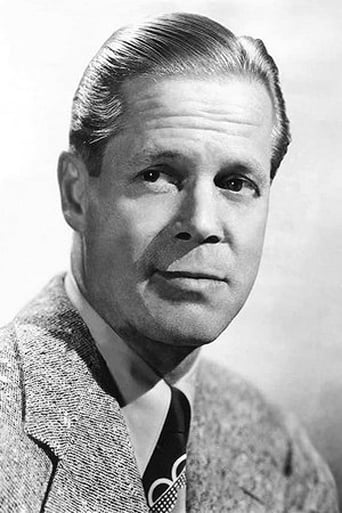ctomvelu1
Edward G. and Joan Bennett star in a noirish crime drama that feels almost surreal (with god reason, as the ending makes plain). Robinson is a staid professor whose family is off on a weekend jaunt. He meets an alluring woman who invites him to he apartment for "drinks and." When her psycho boyfriend unexpectedly shows up, the prof ends up killing him during a scuffle. To protect himself and the gal, he gets rid of the body. Then the fun really starts. Edward G. is at the top of his form here, and Bennett is sexy and ever so slightly tawdry, even fully clothed. The ending, which has been used or misused in many movies before and since, here works beautifully. I am surprised I had never seen this particular melodrama until now. I am no spring chicken, and used to be a film critic, to boot.
felixoteiza
While watching, smitten, the portrait of a beautiful woman in a window, a professor is addressed by the woman herself. After they exchange a few words, she invites him to her apt.. There, after enjoying themselves for a while, they are brutally interrupted by her boyfriend--it seems--who attacks the professor. This last kills the man in self-defense and now he and the woman must deal with the corpse, which he goes to drop in some park, and also with some unwelcome witness of events. Even worse, the crime detective working the case is one of his best friends.I have just finished watching this film and I have to say I liked it a lot better than Scarlet Street, which has the same leading actors and to which it has been rather unfavorably compared. Great cinematography, typical film noir settings--late night in the city, almost empty streets soaked wet after some rain--a dark, unsettling atmosphere, and the gig is on. TWITW would have been worth at least an 8/10, in my opinion, had not been for that silly twist, which allows for a more or less happy ending; one popping up like a rabbit out of a hat, as it doesn't come about as the inevitable result of the natural flow of the plot but which appears as if just tacked there, presumably for the relief of the viewing audience. This is made even worse by the final appearance of the two (dead) villains, now in far nicer, reassuring, attitudes--the only thing missing there is their complimentary bow to the audience. Definitively, the word End should have appeared in the screen during Alice's phone call, while Wanley is slowly drifting into eternal slumber. That would have made of TWITW a true classic of the genre. As it came out, it's not quite a film noir, just a project.What I liked better here is that the plot holds together far more tightly than it does in Scarlet Street. There is nothing forced in the plight of the two main characters-—prof. Wanley and Alice Green--which are after all rather normal people, instead of the stereotypical protagonists of a film noir, and so we all can related to them one way or another. The jam in which they find themselves is, unfortunately, like many we may get ourselves into, any day, even if not necessarily of the same dramatic proportions--just think about someone passing you by, at night, in an empty street, and pushing you and then you pushing the guy back, making him fall and hit his head on the pavement; and then he stays there without moving; what would you do then...? That's the kind of mess honest & decent people get into every day, every hour, somewhere in the world, in your own city. In Scarlet Street instead, both Chris & Kitty could have gotten out of their respective situations the moment they wished, as nobody was forcing them to be there. All what Chris had to do was to stop being a fool and for Kitty to give the pink slip to Johnny-well, that last part may have been a lot easier to say than to do, but anyway. That what's gives the whole situation in SS a contrived nature that allow viewers to stay emotionally detached from the plight of both main protagonists, which is not the case in TWITW.Also there's the fact that TWITW has characters you may actually like, something unusual in a film noir. I loved the Massey character, the way he toys with professor Manley, playing a rather suave, high brow, Columbo to him-—as I have no doubt he must have started suspecting from the beginning that his friend got something to do with that crime, that he knows more about it than he's willing to tell. And if any doubt still remained in his mind, that must have dissipated when Wanley went straight in the right direction, in the lieu of the crime, added this to his hand wound and his poison ivy infection. For most of the length of the movie that Columbo type fencing between both is delightfully entertaining and it's a real pity that all that should have ended with the arrival of the film's villain, Duryea's blackmailer. It's clear, anyway, when we see Massey for the last time--I think when he leaves the lieu of the crime in his car, with Robinson--that he's sure that, when this case is solved, of which he doesn't have by now any doubt, his academic friend will appear involved in it one way or another. It's unfortunate that this Columbo--like banter between Massey and Robinson wouldn't go farther than that, which costs the movie one point in my review. In that sense WITW looks like a film divided in two parts, with only the two leads of the first part remaining for the second.The cinematography is up to Lang standards I say, and the acting is superb across the board, specially from Robinson's part. (My, has this man ever been in a bad movie, has he ever done a bad acting job? I think the answer is No, in either case). A definitive 8/10, if were not for that twist at the end. Come to think of it, maybe this is the reason behind it: the Code demands that people pay for their crimes and if WITW had ended during that phone call, Alice wouldn't have paid for having been an accomplice in the murder. Quite the contrary, she would have been the main beneficiary and, while it's true that she had lost her Sugar Daddy anyway, a girl with her looks wouldn't have had any problem finding another. So, maybe Lang, or the studio, felt forced to end the film that way, just to prevent her from remaining unpunished.

